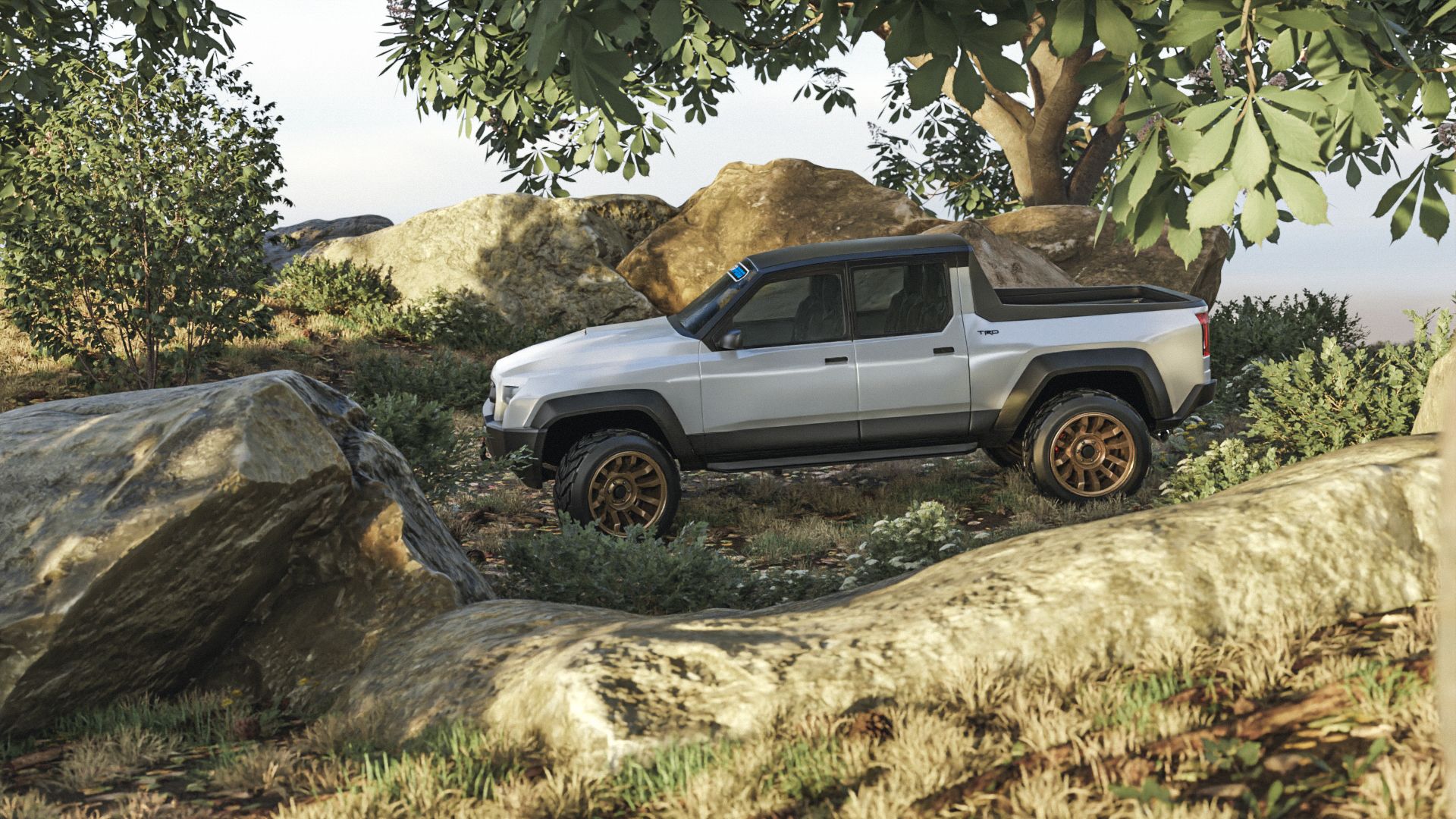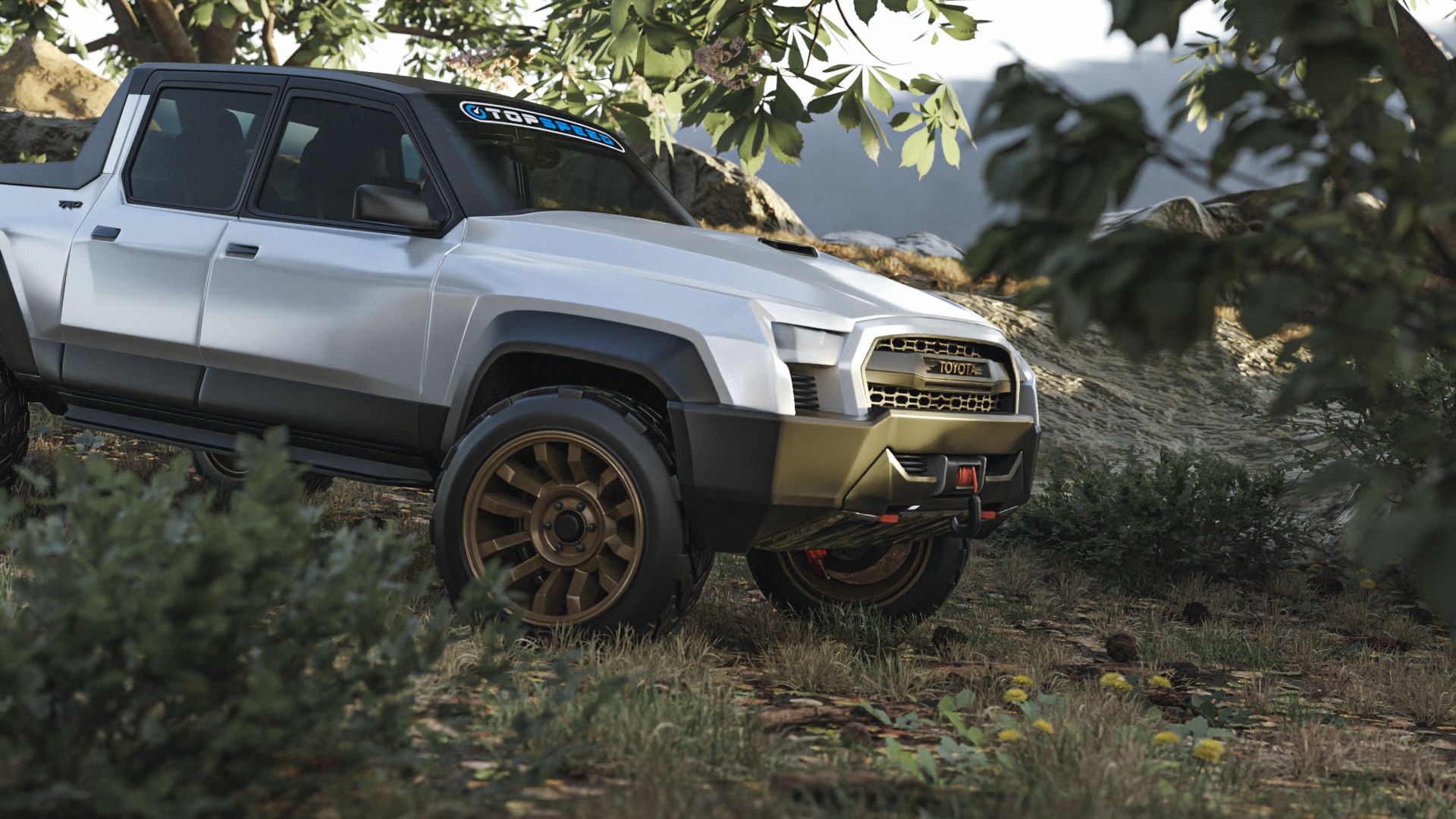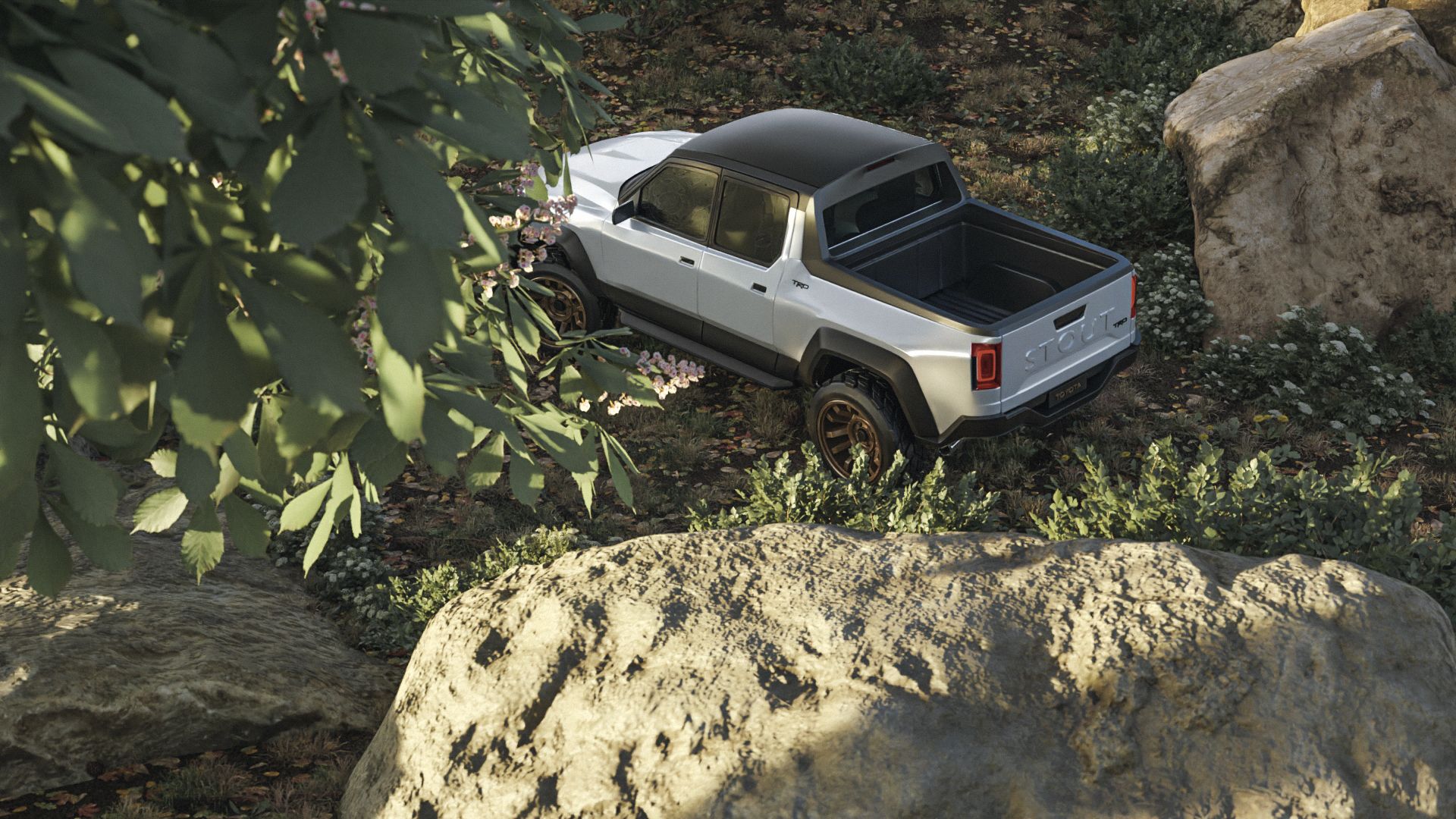[ad_1]
The automotive industry is on the brink of a significant transformation, with electric vehicles (EVs) taking the lead. Among the various EVs making a splash, the Toyota Stout Electric Pickup Truck is generating substantial enthusiasm and expectation. Remember the Toyota Stout? It was a compact pickup truck introduced back in 1964, a time when compact pickups were quite rare. But what piques our interest in discussing a pickup truck that has been absent for decades? The reason is that there’s speculation about the Stout making a comeback. Toyota has been facing sales competition from the Ford Maverick for some time, and it is not taking it lightly. Interestingly, one of the most frequently traded-in vehicles when people opt for a Maverick is the RAV4, a core member of the Toyota family.
Toyota is no stranger to the pickup truck market. In the 1960s, it had the Stout in its lineup of small trucks. Now, the company is preparing to compete with Ford and Hyundai in the compact truck segment, as hinted by some senior Toyota executives. Compact trucks typically share a platform with crossovers, and Toyota already boasts some of the market’s most successful crossovers. This positions the company well to design and produce a new compact truck in significant quantities.
Considering Ford’s recent successes and Toyota’s capability to introduce a new compact pickup, it’s worth contemplating postponing your Maverick purchase and awaiting the rumored Stout. We anticipate the Stout’s grand return to the U.S. market by 2025, as part of Toyota’s electrification strategy scheduled for 2026. Of course, the timeline depends on how quickly the company can perfect its enhanced battery technology, which appears to be progressing well as of Q3 this year. Here’s why the Toyota Stout is worth the wait;
The information in this article was sourced from various reliable sources including Toyota and J.D. Power.
Toyota Will Test Uncharted Territories With The Stout
Toyota is venturing into uncharted terrain with the introduction of the electrified Stout. This marks a significant opportunity for Toyota to explore new avenues in the automotive industry. Although Toyota already offers some electric vehicles, a compact electric truck has been missing from their lineup. The electrified Stout will fill this void and act as a valuable testing ground for Toyota to gather insights into the electric vehicle market. The knowledge and data gleaned from the Stout EV will play a pivotal role in refining upcoming all-electric models, including the Toyota Tacoma EV, Tundra EV, and other electric vehicles in Toyota’s future plans.
Moreover, the upcoming Stout EV might open doors to the development of a Fuel Cell Electric Vehicle (FCEV) variant. Toyota has been actively researching hydrogen fuel-cell technology for its electric vehicles and has expressed intentions to kickstart hydrogen fuel-cell drivetrain production. The Stout is well-suited to test and improve this technology. FCEVs generate electricity through hydrogen-powered fuel cells, offering an alternative to traditional battery-powered electric vehicles. If successful, this could be a game-changing development, offering consumers more options and potentially addressing some of the challenges related to electric vehicle infrastructure and range.
Toyota’s groundbreaking solid-state battery technology is set to revolutionize the power source for electric trucks. These high-density batteries can store a significantly larger amount of energy and are known for their rapid charging capabilities. What’s more, Toyota’s solid-state batteries are notably safer than conventional lithium-ion counterparts. They virtually eliminate the risk of battery combustion, maintain stability even when punctured, and offer enhanced protection against overheating-related fire hazards. Expanding on these advantages, solid-state batteries have the potential to provide an impressive range of up to 745 miles on a single charge. When integrated into the Stout EV, this technology allows for a remarkable 300-mile range, even when towing at its maximum capacity.
The Stout Will Be Built On The Toyota Legacy
In light of Toyota’s illustrious history in off-roading, it’s a reasonable assumption that the Stout will become a valued addition to Toyota’s off-road vehicle family, providing an economical choice for enthusiasts. Toyota boasts a rich off-road heritage with a track record of producing formidable models like the Land Cruiser, 4Runner, Hilux, and the FJ Cruiser throughout the years. Upon the Stout’s release, it is anticipated to bring forth some of the most outstanding off-road capabilities within its category. It’s crucial to bear in mind that while the Stout won’t be an extreme hardcore off-roader like the Tacoma or 4Runner, it will share off-road capabilities typical of crossover vehicles, as compact trucks are built on crossover platforms. For instance, Ford’s Maverick Tremor includes a one-inch lift and a rear locker, demonstrating the potential in the compact truck segment.
Another noteworthy aspect is how Toyota can distinguish the Stout from its rivals by infusing it with a more “truck-like” character. In this context, “truck-like” implies that the Stout could offer improved towing and payload capacities compared to competitors like the Maverick and Santa Cruz, which lean more toward the crossover side. This differentiation could position the Stout as a compact truck with capabilities that approach those of mid-sized pickups, making it an enticing choice for a broader array of consumers.
Toyota has painstakingly built a reputation for producing exceptionally durable and reliable vehicles, and the forthcoming Stout EV has the potential to become a true workhorse. While the F-150 Lightning and Silverado EV may boast larger sizes and potentially higher maximum payload and towing capacities, the Stout EV’s more compact stature could offer unique advantages. Its compact design may enhance agility and yield a superior power-to-weight ratio, resulting in remarkable agility and performance. When combined with Toyota’s renowned reliability and the prospect of a dedicated off-road-focused model, the Stout EV appears well-positioned to emerge as one of the most practical and rugged electric trucks available in the market. Taking into account the most recent dependability awards presented by J.D. Power for current Toyota models, it’s highly probable that the Toyota Stout will follow suit, outperforming its competitors, particularly in this vital category.
Toyota’s Accolades for Reliability:
- 2022 Toyota 4Runner: Highest Quality Midsize SUV
- 2019 Toyota Corolla: Most Dependable Compact Car
- 2019 Toyota Tundra 4WD: Most Dependable Large Light-Duty Pickup
The 2024 Stout is set to incorporate cutting-edge safety technology like never before. Toyota may take a page from Ford’s approach to family-oriented vehicles when integrating safety features into this lineup. Unlike mid-sized and full-sized trucks primarily designed for work, compact trucks often serve as family vehicles, offering the added convenience of an open bed. Hence, ensuring maximum safety in this segment is of utmost importance, with the inclusion of the latest and most advanced vehicle safety features. The unibody construction provides superior safety compared to a traditional body-on-frame setup.
Typical safety features, part of the TSS 3.0 suite (Toyota Safety Sense), encompass:
- Automatic emergency braking with pedestrian detection
- Pre-collision system
- Lane departure alert
- Dynamic radar cruise control
- Lane tracing assist
- Road sign assist
- Automatic high beams
- Proactive driving assist
- Traffic sign recognition
- Adaptive cruise control with lane-centering
- Lane keep assist
- Blind-spot monitoring
- Rear cross-traffic alert
Furthermore, the 2024 Stout is anticipated to incorporate structural enhancements, such as a robust cabin surrounded by crumple zones. Toyota has been placing a strong emphasis on safety in recent years, achieving commendable results in crash tests. As the Stout is likely to be based on existing Toyota crossovers utilizing the TNGA-K platform, there’s every reason to expect it to achieve similar safety ratings. This positions the Stout as a formidable contender for the title of the safest compact truck on the market.
Rugged Styling Will Be One Of The Additional Perks
The forthcoming Toyota Stout, a unibody pickup, is set to flaunt its rugged aesthetics, aligning with Toyota’s recent success in truck design. Toyota has been on a winning streak in the truck styling department, as seen in the recently revealed 2024 Tacoma and Tundra models. Toyota’s design team has successfully blended a rugged, contemporary, and even a touch of classic charm into their trucks, and these stylistic elements are expected to carry over into the compact pickup category. Enthusiasts can look forward to a scaled-down iteration of the new Tundra and Tacoma, potentially featuring flared wheel arches and a bold front-end design.
The all-new Toyota Stout has the potential to outshine its rivals in terms of design, possibly surpassing them. Many drivers have praised the fresh aesthetics of Toyota’s Tacoma and Tundra, and this upcoming model could complete the trio of well-executed releases from the brand. When it debuts in the market, the Toyota Stout stands a strong chance of becoming the most attractive compact truck. In comparison, Hyundai’s Santa Cruz is considered somewhat “soft,” while the Maverick is viewed as a bit too simplistic in design.
The Stout is designed to strike a perfect balance between contemporary aesthetics and a utilitarian feel. Some digital renderings online suggest a front-end design reminiscent of the Compact Cruiser EV concept seen last year. We’ve created these renderings to provide a sneak peek at what the 2024 Stout might resemble. Rumors indicate that this lineup will feature a more rugged design. While Toyota has provided some insights into the final appearance of the Stout, our renderings offer an alternative perspective on the potential 2025 release. These renderings illustrate a truck with a slightly lower profile than a typical off-roader, a design that could offer advantages both off-road and in urban environments where parking space is a premium. Toyota has traditionally catered to adventurous customers who embrace outdoor exploration, and the Stout, as depicted in our images, appears adaptable to various driving conditions and driver preferences, a quality that Toyota is determined to deliver.
The Stout Will Be More Efficient Than Its Rivals
The Stout EV is positioned to surpass its competitors in terms of efficiency. While the 2023 Ford F-150 Lightning Platinum and Silverado EVs are undeniably efficient, their larger size poses a notable constraint. In contrast, the Stout EV is set to be a more compact truck, which equates to improved powertrain efficiency. For reference, the Ford F-150 Lightning offers two battery options: a 98.0-kWh battery pack with a 230-mile range and a larger 131.0-kWh battery with a 320-mile range.
Efficiency Ratings
|
Ford F-150 Lightning |
Chevrolet Silverado EV |
|
|
City |
78 MPGe |
67 MPGe |
|
Highway |
67 MPGe |
59 MPGe |
(Specs sourced from Ford and Chevrolet)
Meanwhile, the Silverado EV boasts an impressive 200 kWh battery capacity, courtesy of GM’s Ultium platform, delivering a remarkable 450-mile range on a single charge. While these trucks achieve respectable efficiency, the Stout EV is poised to outperform them when it enters the market. The anticipated Toyota Stout is a model to watch for. Though the exact release date remains unconfirmed, it is expected around 2024 or 2025. Given the high demand for the Ford Maverick, which leads to extended wait times, considering waiting for the Toyota Stout’s release is a wise choice. Toyota has also recently registered the name “Stout” in Argentina, indicating ongoing development efforts.
If the Stout is announced for 2024 or 2025, it will likely be based on the TNGA-K platform, shared with models like the RAV4, Highlander, and Camry. This platform is known for its sturdy yet lightweight construction and has a track record of success with various powertrains, offering benefits like a low center of gravity and excellent handling. While marketing a smaller electric truck can be challenging, the Stout is likely targeting eco-conscious individuals seeking an off-road-capable, sleek, and comfortable vehicle, rather than heavy-duty cargo haulers. Although driving pleasure may not be the Stout’s primary focus, these attributes contribute positively to its overall performance.
With the right system, added capabilities compared to current competitors, an appealing design, and competitive pricing, the Stout has the potential to become a top choice in the compact truck segment. While official production confirmation is pending as of September 2023, Toyota’s history of swift action suggests an announcement could be imminent. Therefore, staying updated on the Toyota Stout in the coming months is advisable for those interested in a small and efficient truck.
[ad_2]
Source link


